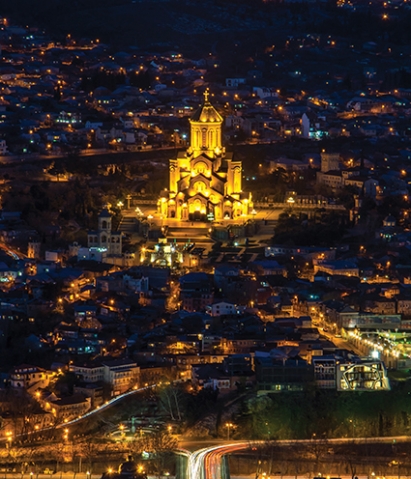Christianity in Georgia: The Resilience of a Faith & Nation
The story of Tbilisi’s Holy Trinity Cathedral is much like the one of Georgia itself.
The Cathedral’s construction was halted in the late 1980s due to civil unrest and political and economic challenges. Nevertheless, the Cathedral was eventually built and now overlooks the capital of Tbilisi, reminding Georgians of their centuries-long commitment to the Christian faith.
Much like the Cathedral, Georgia’s strong relationship with Christianity serves as a towering and beautiful reminder of the resilience and everlasting faith of its people.
Georgia continues to be a beacon for freedom of belief: although Georgia is an ongoing bedrock of Christianity, many different religions are able to coexist peacefully in the nation. A walk through Old Town Tbilisi will reveal a mosque, a Jewish synagogue, and a church in close proximity to one other.
President Donald Trump, in his speech in Poland on July 6, acknowledged the importance of religious liberty in Western societies.
“We reward brilliance,” President Trump proclaimed in Warsaw. “We strive for excellence, and cherish inspiring works of art that honor God. We treasure the rule of law and protect the right to free speech and free expression…The people of Poland, the people of America, and the people of Europe still cry out ‘We want God.’”
For centuries, Georgia has cried out, “We want God.”
Faith runs deep in Georgia’s roots, often outlasting any challenges the nation has faced in its long history. Christianity became the state religion as early as the fourth century in some parts of Georgia. In the fifth century, the Bible was translated into Georgian. The independent Orthodox Church dates back anywhere from the fifth to tenth centuries. When faced with invasions and occupations over a period of more than 400 years, Georgia’s Christian heritage only deepened. During the anti-religious Soviet period of the 20th century, Georgia’s faith, again, only strengthened.
While others have come apart under such pressure, Georgia has become a stronger and more resilient nation because of its religious roots.
Georgia is where one can find a solid bedrock of Christianity in Europe: by most reports, more than 85 percent of Georgia’s residents are Christian, and almost 90 percent of those residents consider themselves active participants in the Church. Christianity shapes the lives of many Georgians in everything they do.
Christianity, in a large part, is the basis for Georgia itself, it’s in Georgia’s DNA. For many Georgians, Christianity serves as their “one voice.” Their faith unites them.
Christianity is also an organic piece of Georgia’s democratic development. There is a strong correlation between religious liberty, strength of religion, and a prospering democratic society. According to a University of Notre Dame study, most countries of the post-Soviet space suffer from high or moderate levels of religious persecution. Not Georgia. In fact, the study showed no significant level of religious persecution within Georgia.
This is powerful for a country often considered the “gate” between the East and the West. For a nation that has been a sort of “one-man band” when it comes to facilitating East-West interaction over many centuries, Georgia’s strong hold on its Christian faith has never wavered.
Historically, Georgia was a good cultural translator of East into West, and vice versa. This service to the region, built on the foundations of faith, has transformed into political and strategic translation in modern times. Georgia’s strong ties to faith make it a strong democratic partner in any political realm; fighting terrorism, countering extreme ideologies, promoting economic welfare, and encouraging freedom of expression.
For years past, Georgia has used its strong ties to Christianity to weather the political storms of invasion, war, and oppression. In the years to come, Georgia will continue to draw upon its faith to be a strong partner to other nations, promote democratic development, and to provide a safe-haven for any and all believers.
Iase Sikharulidze












